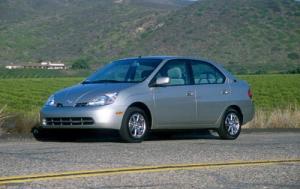In today's very high-priced used car market, many shoppers are now looking for "older" models that have aged well as a way to save significant dollars.
The Prius is certainly one of those models and with careful shopping an older Prius can definitely be a viable and more economical option at this time.
And not only has the Prius earned a solid reputation for reliability, but many owners tend to take very good care of their vehicles, which has resulted in well below-average mileage candidates to be found out there.
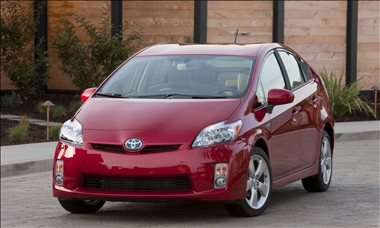
And while most automakers have played catchup in the hybrid market, the Prius has pretty much been the standard-setter in this segment, winning wide acclaim for its fuel economy, fairly uncompromized acceleration and handling, and reasonable pricing.
But reliability and dependability become all the more crucial when considering an older vehicle. And with the Prius, beyond the usual mechanical issues all cars experience (see the Prius' list below), there's the additional issue of its hybrid battery.
The Used Toyota Prius Battery Issue
Toyota's battery warranty is for 8 years or 100,000 miles, whichever comes first. For those vehicles that have already exceeded this, it becomes a possible expensive repair at some point.
And although, history has proven that many have lasted much longer, with reports of over 200,000 not being uncommon, it is best to either find candidates that have already replaced their battery, or factor in this potential cost into your acceptable purchase price.
Here's why:
The replacement cost for a new battery can be as high as $4,000, all inclusive, at a Toyota Dealership. With careful shopping, you may be able to get the same at a local independent shop in the $2,000 range.
And there's also a possibility that the battery can be fixed in some cases, depending on the number of damaged cells. That cost can be in the $500 to $1,800 range.
Other options would include installing it yourself to save on the labor cost, or buying used or remanufactured batteries which are usually priced in the $1,500 range, all inclusive. You should shop around for better deals though.
All of this is quite do-able, but is also a bit of an added pain (and uncertain expense), making finding an older Prius that has already replaced the battery possibly a more appealing option for many buyers. Or, really try to find a very low-mileage vehicle.
Next, ...
- We'll do an overview of two older Toyota Prius generations, specifically the second and third, which were produced for the 2004 - 2015 model years.
- Then we'll list possible mechanical issues that have been reported by owners for each generation so they can be checked before buying one today.
- And then we'll summarize the overall pros and cons of an older Toyota Prius worth consideration by potential buyers.
But first, and very importantly ...
Things To Do When Considering An "Older" Vehicle
Locate Lower Mileage Vehicles: They are certainly out there to be found with careful and patient shopping. Be willing to drive a distance if you have to.
Vehicle History and Maintenance: Ask for the vehicle history report (CarFax or AutoCheck) as well as documented maintenance and repair records. If not provided by the Dealer or private seller, it's usually best to move on.
Pre-Purchase Inspection: Have the vehicle independently inspected before making a final decision. This usually will cost in the $150-$200 range but is well worth it given the potentially thousands in savings over the long term.
And My #1 Price Tip: Please, always get online price quotes at auto sites such as CarsDirect.com and Edmunds.com (both, actually), whether looking for a new or used car. Competition among dealers for your business does amazing things to prices, and it's so easy. It really does make a difference.
And quickly, while we're at it, my #2 Tip is to always know the up-to-date trade-in value of your current car. You can get a quick and surprisingly accurate one at Edmund's Trade-In Quotes.
It's free and just takes a couple of minutes. I think what helps its accuracy is the inputs will include either your plate# or VIN# followed by many simple, but specific, yes/no questions. It really focuses in on the detail of the specific vehicle.
Third Generation Toyota Prius (2010- 2015)
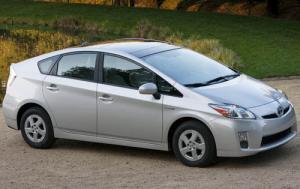
There was a redesign for the 2010 Prius with the more significant changes including added power while still increasing fuel economy, improved steering responsiveness, a sleeker exterior design and more conventional-looking interior controls.
This generation also saw the introduction of a Prius V wagon, a compact Prius C and a plug-in model (the standard hatchback is now called the liftback).
Under the hood of this version is a 1.8-liter gasoline engine that produces 98 horsepower and 105 pound-feet of torque that's paired with two electric motors (one for propulsion, the other for the electrical system) and a planetary-type continuously variable transmission (CVT).
The total system output is 134 horsepower. Gas mileage for this Prius is an EPA-estimated 51 mpg city and 48 mpg on the highway.
Highlights of standard features for the Prius Two include Bluetooth, automatic climate control, keyless ignition/entry, a touchscreen interface and an iPod/USB audio interface.
The Prius Three then adds navigation, Toyota's Entune system and a rearview camera, while the Prius Four adds an upgraded stereo, faux leather upholstery, a power driver seat and heated front seats.
The top-of-the-line Prius Five adds LED headlamps with auto-leveling and washers, 17-inch alloy wheels and foglamps.
Depending on the model, Prius models from this run can also be found with options such as a sport-tuned suspension, an upgraded navigation system, a solar-powered ventilation system, a head-up display, a lane-departure warning system, an aerodynamic body kit, and adaptive cruise control.
2010 - 2015 Toyota Prius Possible Mechanical Problems
While this third generation Toyota Prius is generally known for its reliability, like any vehicle, it may have experienced certain mechanical issues over time. It's important to note that individual experiences can vary, and regular maintenance plays a key role in preventing or addressing potential problems.
Here are issues reported by some Prius owners that should therefore be included in an inspection before buying:
Hybrid Battery Issues: While hybrid batteries are designed to be durable, they degrade over time. Some Prius owners have reported issues with the hybrid battery, leading to reduced fuel efficiency or warning lights on the dashboard.
Replacement costs for hybrid batteries can be relatively high, but prices have come down in recent years.
Inverter Coolant Pump Failure: Some Prius models experienced issues with the inverter coolant pump, leading to potential overheating problems. Toyota issued recalls and addressed this issue in certain model years.
Brake Actuator Issues: There have been reports of problems with the brake actuator, which may result in warning lights related to the anti-lock braking system (ABS) or traction control. Toyota addressed this with recalls for specific model years.
Oil Consumption: Some Prius owners have reported higher-than-normal oil consumption. This issue may be related to piston ring wear.
Water Pump Failure: Water pump issues have been reported in some Prius models. Failure of the water pump can lead to overheating problems. Addressed in recalls for specific model years.
Coolant Leaks: Coolant leaks from the water pump or other components have been reported by some Prius owners.
It's important to emphasize that Toyota often addressed these issues through recalls and extended warranties. You shoud make sure that any covered repairs were completed in any vehicle you are considering.
Second Generation Toyota Prius (2004- 2010)
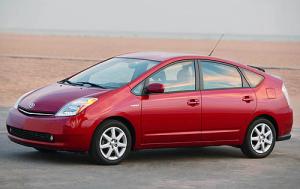
After debuting in the U.S. in 2001, the Prius was redesigned for the 2004 model year and upgraded with more size, more power, and more features, while the price remained the same.
It evolved from a 4-door sedan into a sloped-roof 4-door hatchback that added 6.9 inches in wheelbase, 6.3 inches in total length, 1.2 inches in height and nearly 2 inches in width, but only increased weight by 125 pounds.
This newer Prius, while still classified a compact, now rivaled the Camry for passenger room and cargo space while still achieving some of the industry's best EPA fuel-efficieny ratings.
As in the previous 2001 to 2003 generation, this Prius was equipped with a 1.5-liter four-cylinder engine coupled with a battery-driven electric motor driving the front wheels with a continuously variable automatic transmission (CVT). The CVT allows the Prius to furnish a nearly infinite number of drive ratios, as determined by its powertrain computer.
In addition, performance efficiency was enhanced with new "by-wire" electronics replacing mechanical linkages for both the accelerator and shift lever.
Efficiency was also improved by using the electric motor to drive the power-steering pump and air-conditioning compressor. Also new was a powertrain feature, "hill acceleration control", which was designed to maintain a steady speed up and down steep slopes.
Safety features included standard antilock brakes and traction control, while an antiskid system was made available as an option. Also made available for the first time were front side airbags as well as front and rear curtain side airbags.
Car Buying Tips:
Do This To Get The Best Price For Your Trade-In
Good Bank Repossessed Cars For Sale
Other new optional features included a "smart" keyless entry and keyless engine-starting system with a pocket transmitter, as well as xenon headlamps. And the optional navigation system added voice-command.
There weren't a whole lot of changes during the this second generation. Older used Prius shoppers should note, however, that a number of popular options were added for 2006, including leather upholstery, a back-up camera, an auxiliary audio jack and a leather-wrapped steering wheel.
For 2007, a Prius Touring model joined the lineup featuring a somewhat firmer suspension for a "sportier" ride, different 16-inch alloy wheels, foglamps, xenon headlights and a larger rear lip spoiler.
In addition, 2007 saw side airbags and side curtain airbags became standard for all models.
And for the 2008 model year, a new "standard" trim level was added which dropped heated mirrors and cruise control and added different 15-inch wheels in order to offer a significantly lower base price.
2004 - 2009 Toyota Prius Possible Mechanical Problems
Inverter Coolant Pump Issues: Some Prius models from this generation experienced problems with the inverter coolant pump, leading to potential overheating issues. Toyota addressed this issue through recalls, and affected vehicles had the coolant pump replaced.
Steering Intermediate Shaft Noise: Some owners reported a clunking or rattling noise in the steering intermediate shaft. This issue could result in a feeling of looseness in the steering. Toyota addressed this with technical service bulletins, and some vehicles had the intermediate shaft replaced.
Brake Actuator Issues: Certain Prius models experienced problems with the brake actuator, leading to warning lights related to the anti-lock braking system (ABS) or traction control. Toyota addressed this issue through recalls and extended warranties.
Stalling Issues: There were occasional reports of stalling or hesitation during acceleration, which could be attributed to various factors, including software glitches. Toyota addressed some of these concerns through software updates and recalls.
Accelerator Pedal Sensor Recall: In 2010, Toyota conducted a massive recall related to accelerator pedal sensors affecting multiple models, including some Prius vehicles. The recall aimed to address unintended acceleration concerns.
Oil Consumption: Some owners reported higher-than-expected oil consumption. This issue was attributed to problems such as piston ring wear.
As noted above, Toyota often addressed issues through recalls, extended warranties, or technical service bulletins. Before buying, make sure the vehicle has had this work done.
Overall Older Toyota Prius Pros And Cons
Older Prius Pros
Cost Savings: Obviously, older models tend to be significantly cheaper than newer ones, saving a substantial amount of money upfront. However, this savings has to be weighed against the increased risk for possibly higher maintenance and repair costs going forward.
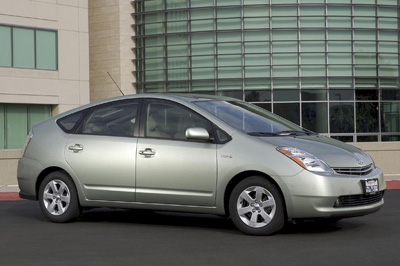
Low Operating Costs: The Prius's hybrid system often results in lower wear and tear on traditional components, such as brake pads, due to regenerative braking. This can contribute to lower operating costs.
Fuel Efficiency: The Prius is known for its excellent fuel efficiency, and the third generation continues this trend with high miles per gallon (MPG) ratings.
Reliability: Toyota has a reputation for building reliable vehicles, and the Prius is no exception. Many owners report minimal issues and low maintenance costs.
Environmental Impact: As a hybrid vehicle, the Prius produces fewer emissions than traditional gasoline-powered cars, making it a more environmentally friendly option.
Spacious Interior: The Prius is designed to maximize interior space, providing ample legroom and headroom for both front and rear passengers.
Quiet Ride: The hybrid drivetrain contributes to a quiet and smooth driving experience, enhancing overall comfort.
Versatile Cargo Space: The Prius offers a hatchback design, providing a versatile cargo area with the ability to fold down the rear seats for additional space.
Flat Load Floor: The flat load floor enhances practicality, making it easier to load and unload cargo of various shapes and sizes.
Older Prius Cons
Battery Replacement Costs: The hybrid battery, while generally more durable than originally expected and further improved over the years, may need replacement at some point, and the cost of a new hybrid battery can be relatively high.
Specialized Repairs: As a hybrid, some repairs on the Prius may require specialized knowledge and equipment. Not all mechanics are familiar with hybrid systems, which could potentially lead to higher labor costs for repairs.
Complexity of Technology: The advanced technology in hybrid vehicles, while contributing to fuel efficiency, can also lead to higher repair costs if issues arise. Diagnostic and repair procedures for hybrid systems may be more complex than those for traditional vehicles.
Age-Related Wear: Like any vehicle, as a Prius ages, certain components may wear out, leading to potential maintenance costs. This can include items such as suspension components, belts, and other wear-and-tear items.
Dealer Service Costs: Getting maintenance and repairs done at a dealership might be more expensive than at independent repair shops. Even so, some owners prefer dealership services for specialized knowledge.
Aging Technology: These older Prius models may lack some of the latest technology features and safety advancements found in more recent models.
Interior Quality: While the Prius is practical, some critics note that the interior materials may not be as high-quality as those found in some competing vehicles.
Exterior Styling: The Prius's distinctive exterior design may be polarizing. Some people appreciate its unique look, while others find it less appealing.
Performance: The Prius prioritizes fuel efficiency over performance. Acceleration and handling may not be as sporty or responsive as in some other vehicles.
Infotainment System Complexity: Some users may find the infotainment system complex and not as user-friendly as they'd prefer.
Limited Height for Bulky Items: The sloping roofline may limit the height of items that can be accommodated in the cargo area.
 By Josh Rosenberg
By Josh Rosenberg